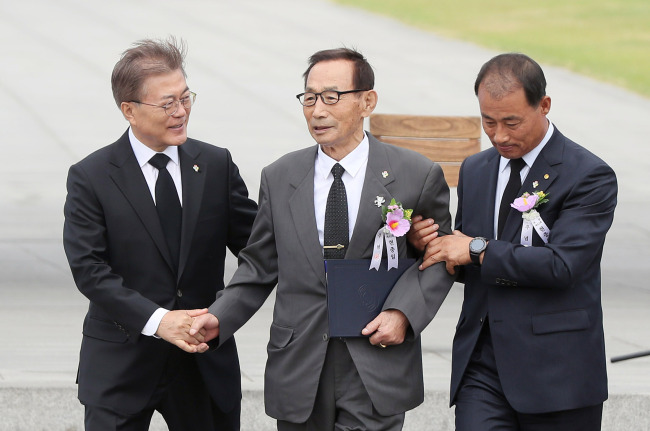Moon promises better treatment for patriots, end to ideological division
By Korea HeraldPublished : June 6, 2017 - 18:14
President Moon Jae-in on Tuesday promised to ensure veterans, independence fighters and other unsung patriots of South Korea receive proper treatment and to end ideological division in the country.
Speaking at an event marking Memorial Day at Seoul National Cemetery on Tuesday, Moon highlighted the sacrifices of soldiers and those who fought for liberation from Japanese colonial rule. Moon also reiterated his plans to raise the chief of the Ministry of Patriots and Veterans Affairs to a ministerial level post in order to better care for those concerned. At present, the head of the ministry is a vice minister-level post.
Speaking at an event marking Memorial Day at Seoul National Cemetery on Tuesday, Moon highlighted the sacrifices of soldiers and those who fought for liberation from Japanese colonial rule. Moon also reiterated his plans to raise the chief of the Ministry of Patriots and Veterans Affairs to a ministerial level post in order to better care for those concerned. At present, the head of the ministry is a vice minister-level post.

“I think about patriotism today here at the Seoul National Cemetery. Without the patriotism of the people, today’s Republic of Korea would not exist,” Moon said, emphasizing that their sacrifice enabled the country to overcome the numerous challenges it has faced over the past 100 years.
Moon promised to shed more light on independence fighters, citing the common saying “independence fighters experience hardship for three generations, while Japanese collaborators succeed for three generations.”
“The reward for patriotism must not end with empty words of honor,” Moon said.
The president also touched on the issue of those who volunteered as combatants and noncombatants during the Korean War, and the matter of locating the remains of those who died in the war. Moon also promised to give more attention to South Korean veterans of the Korean War who volunteered while still students.
Regarding veterans of the Vietnam War, Moon promised governmental aid in treating disabilities and illnesses sustained, referring to the medical conditions of affected veterans as a “debt the country must be responsible for.”
About 320,000 South Korean soldiers served tours in Vietnam between 1965 and 1973. About 5,000 South Korean soldiers were killed, with 15,000 wounded.
Moon, however, did not only focus on such individuals commonly associated with patriotism, going on to list laborers and democracy activists as patriots.
“Today, I want to recall with you the fact that dedication and sacrifice for the country did not only appear on the battlefield and in the independence movement,” Moon said.
The miners and nurses sent to Germany as well as the laborers who worked in difficult conditions during the 1960s through the 1980s were behind the “Miracle on the Han River,” Moon said, bestowing on them “a medal of the heart.” Between 1966 and 1976, 10,000 nurses were sent to Germany, while some 7,900 miners were dispatched between 1963 and 1980 as part of the government’s drive to reduce unemployment and raise foreign reserves.
“Patriotism is what allowed today’s Korea to exist. Each and every one who sacrificed for the country are (part of) Korea -- a Korea that cannot be divided as liberals or conservatives, a Korea as a whole,” Moon said.
He added that such unity must form the foundation of a “new Korea,” calling on attendees of the event to help end ideological division in the country.
“(I) will not repeat the unhappy past when the history of patriotism was used to rule. I will clear out the politics of division, politics of ideology when the experience of war was used as a tool for ruling,” Moon said.
“There must be the unshakeable belief that dedication to the country will be rewarded and that traitors will be punished. That is a country that is worthy of the name, one to which the people can dedicate their patriotism to.”
By Choi He-suk (cheesuk@heraldcorp.com)
-
Articles by Korea Herald




![[Herald Interview] 'Amid aging population, Korea to invite more young professionals from overseas'](http://res.heraldm.com/phpwas/restmb_idxmake.php?idx=644&simg=/content/image/2024/04/24/20240424050844_0.jpg&u=20240424200058)












![[KH Explains] Korean shipbuilding stocks rally: Real growth or bubble?](http://res.heraldm.com/phpwas/restmb_idxmake.php?idx=652&simg=/content/image/2024/04/25/20240425050656_0.jpg&u=)

